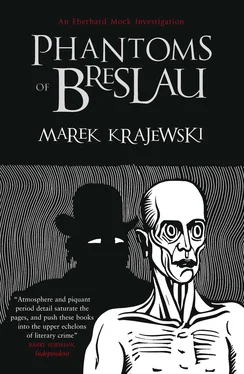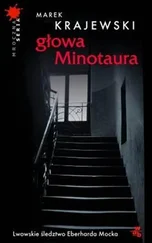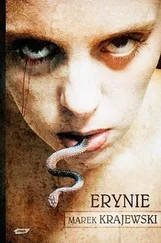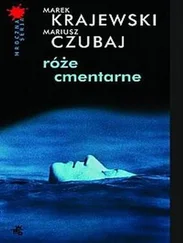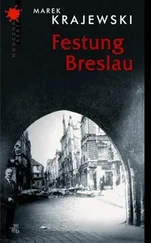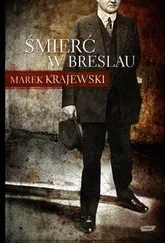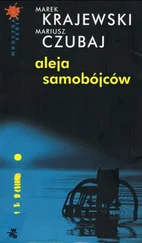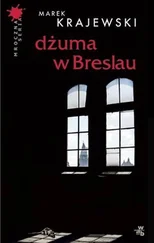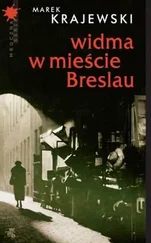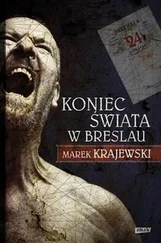Marek Krajewski - Phantoms of Breslau
Здесь есть возможность читать онлайн «Marek Krajewski - Phantoms of Breslau» весь текст электронной книги совершенно бесплатно (целиком полную версию без сокращений). В некоторых случаях можно слушать аудио, скачать через торрент в формате fb2 и присутствует краткое содержание. Жанр: Полицейский детектив, на английском языке. Описание произведения, (предисловие) а так же отзывы посетителей доступны на портале библиотеки ЛибКат.
- Название:Phantoms of Breslau
- Автор:
- Жанр:
- Год:неизвестен
- ISBN:нет данных
- Рейтинг книги:3 / 5. Голосов: 1
-
Избранное:Добавить в избранное
- Отзывы:
-
Ваша оценка:
- 60
- 1
- 2
- 3
- 4
- 5
Phantoms of Breslau: краткое содержание, описание и аннотация
Предлагаем к чтению аннотацию, описание, краткое содержание или предисловие (зависит от того, что написал сам автор книги «Phantoms of Breslau»). Если вы не нашли необходимую информацию о книге — напишите в комментариях, мы постараемся отыскать её.
Phantoms of Breslau — читать онлайн бесплатно полную книгу (весь текст) целиком
Ниже представлен текст книги, разбитый по страницам. Система сохранения места последней прочитанной страницы, позволяет с удобством читать онлайн бесплатно книгу «Phantoms of Breslau», без необходимости каждый раз заново искать на чём Вы остановились. Поставьте закладку, и сможете в любой момент перейти на страницу, на которой закончили чтение.
Интервал:
Закладка:
“I’m extremely sorry, Professor Moravjetz! I’ve not learned it for today, but I’ll know it all by tomorrow! All fifty verses!”
His diaphragm surged and a mighty hiccough forced its way through Mock’s gullet. He pulled a key from his pocket and pushed it into the hole. There was a grating, and he felt the metal resist. Swaying, he produced a metal pipe-cleaning brush from his pocket and slipped that into the keyhole. He pressed his whole weight down on the primitive lever and heard a crack as the cleaning brush snapped. A Mauser 98 appeared in his hand. He aimed at the lock and pulled the trigger.
The noise shook the tenement. Doors to the other apartments opened. Someone shouted at Mock from above:
“What are you doing, you drunken pig? You live one floor up!”
Mock kicked the lock with his heel and forced his way into the hallway. “Did you hear that noise, like a gunshot?” somebody was shouting. “It’s him! He’s here already!” Mock stood unsteadily in the middle of the hallway before proceeding slowly, his spurs clanking. He came to a velvet curtain and drew it aside. He entered another hallway. It was a waiting room, with doors giving on to several rooms. One of them was ajar, but another heavy curtain hung from its lintel. One of the walls had no door but a window. It gave on to the ventilation pit. Outside on the window sill stood a paraffin lamp whose feeble glow barely penetrated the dusty pane. In the meagre twilight, Mock saw a number of people sitting in the waiting room. He did not manage to get a good look at them as his attention was drawn to the curtain hanging over the door. It moved suddenly. A cold draught and a sigh drifted from beyond it. Mock began to walk towards it, but a tall man in a top hat stood in his way. When Mock tried to move him aside the latter took off his headwear. In the pale semi-darkness he saw a knot of scar tissue as it refracted the dim light; the scars criss-crossed and interweaved in the man’s eye sockets. Instead of eyes he had a tangle of scars.
Mock stepped back but was not afraid. He shoved the blind man against the wall, laughed out loud and grabbed the edge of the curtain. From behind it two voices, those of a man and a woman, were uttering inarticulate sounds. Mock yanked at the fabric and caught his spur on an unevenness in the floor. He tumbled onto the sandstone flags and, with a rattle of fastening hooks, the thick green plush tore away and flowed down over him like a shroud. He pulled himself up and advanced on all fours towards an elderly woman who was sitting in the small room beyond the curtain, wheezing. She wore a trailing dark robe. The lamp on the windowsill illuminated her toothless mouth, and from it poured a white swathe which fell in tangles and folds at her feet.
“Ectoplasm!” shrieked a woman’s high-pitched voice. “She’s materialized it!”
Mock shook with a suppressed hiccough, which was all the stronger for being accompanied by drunken, uncontrollable laughter. The patter of the feet of curious neighbours resounded in the apartment.
“What ectoplasm!” Mock was in convulsions of laughter. He got up, tripped and made towards the medium, who was frozen in a trance. Without the slightest disgust he began to extract long white strips from the old woman’s mouth. “It’s an ordinary bandage!”
“Bandage! It’s an ordinary bandage!” said a man’s stifled voice. “A bunch of frauds, not psychics! And you wanted to make me believe it! I’m going to write everything in the Konigsberger Allgemeine Zeitung .”
“He’s wrong, the drunk,” a loud voice answered. “‘Blessed are those who have not seen and yet have believed!’ I have no eyes, but I do believe …”
Mock was still unravelling the bandage when he felt a blow to his midriff. He clasped his stomach, amazed at the strength of the toothless woman’s punch. Her eyes were still closed as she aimed another blow, this time at his chin. His boots and spurs skidded apart on the bandage, which was sodden with mucus and saliva. He hurtled towards the window. It was not quite shut. He felt the sill beneath his buttocks, and then nothing.
BRESLAU, THAT SAME SEPTEMBER 28TH, 1919
NOON
“And now get up and sit at the desk,” said Ruhtgard.
Mock obeyed. He got up, sat at the desk and joined his hands. He stared down at the green desk leather as Ruhtgard placed a sheet of stiff, decorated wove paper and a Colonia fountain pen in front of him. Then he extracted a wallet adorned with the Konigsberg coat of arms from the inside pocket of his jacket and held it open in front of him.
“Write down what I dictate to you,” Ruhtgard spoke loudly and clearly. “I, Eberhard Mock, the undersigned, being of sound body and mind, declare that on 28th November, 1916, in the city of Konigsberg on Pregolya, I was witness to a spiritual seance. Prompted by ill-will and under the influence of alcohol, I attempted to catch hold of the ectoplasm issuing through the mouth of the medium, Frau Natasha Vorobiev. Failing to do so, I assured those assembled that I had caught hold of a bandage, and that the entire seance was a sham. My behaviour prompted Herr Harry Hempflich, a journalist from the Konigsberger Allgemeine Zeitung , to publish in his newspaper on 31st November a slanderous article aimed against spiritualism. I hereby declare that all the information presented by H. Hempflich and based on my so-called experiences are false and spring from my materialist and scientific outlook on life. I also ardently declare that I firmly believe in the existence of spirits and phantoms, having experienced their activity in my house on Plesserstrasse. At the same time I vouch to assume responsibility for the deaths of six people, namely, Julius Wohsedt, Johanna Voigten and four sailors. They suffered death for a great cause — to prove to me that spirits do exist. If I had not disbelieved, those persons would still be alive. Blessed are those who have not seen and yet have believed. Eberhard Mock.”
Mock finished writing. Ruhtgard put the wallet back into his jacket. He folded the letter Mock had written into four and slipped it into an envelope. Then he placed the envelope in front of the police officer sitting at his desk and said in a loud voice:
“Address it to Herr Harry Hempflich, Chief Editor, Konigsberger Allgemeine Zeitung . And now get up and go to the door!”
Mock stopped in the doorway, his eyes still closed.
“Walk down the corridor and through the first door on the left!”
Mock walked into the games room, with Ruhtgard following him.
“Walk over to the balcony door, open it and walk out on to the balcony!”
Mock knocked into the piano in the middle of the room, but soon found his way to the balcony. He opened the balcony door and stepped onto the small terrace.
“Climb onto the balcony ledge and jump!”
Mock clambered onto the ledge with difficulty. He held onto the balustrade with one hand, and with the other grabbed an enormous flowerpot that was secured to the ledge with a metal hoop. The flowerpot broke away and smashed onto the pavement between the spiked railings and the tenement wall. Mock lost his balance and fell back heavily onto the balcony floor.
“Stand on the ledge!”
Mock lifted his leg and placed it once again on the stone balustrade, holding on to the wall with one hand with such ease as if walking the tightrope was his daily bread.
“And now jump, impale yourself on those railings!”
Mock jumped.
BRESLAU, THAT SAME SEPTEMBER 28TH, 1919
ONE O’CLOCK IN THE AFTERNOON
Mock jumped. His torso was not impaled on the railings, however; his legs did not hang from its arrow-shaped spikes or thrash at the metal in agony. Mock turned his shoulders and jumped … from the balustrade onto the balcony. But not by choice. As he was bending his knees to launch himself off the balustrade and soar in a wide arch onto the spiked railings, a tall figure who had been squatting in the corner of the balcony sprang to his feet. A strong, freckled hand covered with thick red hair grabbed him by the tails of his jacket and pulled him forcefully to itself.
Читать дальшеИнтервал:
Закладка:
Похожие книги на «Phantoms of Breslau»
Представляем Вашему вниманию похожие книги на «Phantoms of Breslau» списком для выбора. Мы отобрали схожую по названию и смыслу литературу в надежде предоставить читателям больше вариантов отыскать новые, интересные, ещё непрочитанные произведения.
Обсуждение, отзывы о книге «Phantoms of Breslau» и просто собственные мнения читателей. Оставьте ваши комментарии, напишите, что Вы думаете о произведении, его смысле или главных героях. Укажите что конкретно понравилось, а что нет, и почему Вы так считаете.
